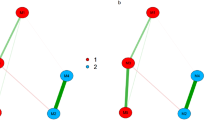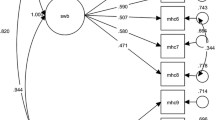Abstract
The objectives of this study were to develop a Bangla version of the World Health Organization Quality of Life questionnaire (WHOQOL-BREF), and assess its reliability and validity on an adolescent population in Bangladesh. In total, 187 boys (mean age 14.6 years ± SD 2.1) and 137 girls (15.2 ± SD 2.0) from residential areas, and 157 boys (13.8 ± SD 2.1) and 121 girls (13.4 ± SD 2.1) from slums in Dhaka were interviewed using a questionnaire, which included a Bangla translation of the WHOQOL-BREF. Thirty-eight randomly selected adolescents from the original interviewed group were re-administered the same questionnaire 1 week later. On the whole, the Bangla version of WHOQOL-BREF showed good internal consistency and test–retest reliability. In comparisons between residential and slum areas, discriminant validities were observed in the total and environmental domain of both genders and in the social relationship domain of males. Furthermore, discriminant validities of physical and psychological domains were observed in gender comparisons. These results suggest that the Bangla version of WHOQOL-BREF is valid and reliable in assessing the quality of life of adolescents in Bangladesh.
Similar content being viewed by others
References
World Health Organization. WHOQOL: Measuring Quality of Life. Geneva: WHO, 1997
World Health Organization. WHOQOL Study Protocol: WHO, 1993
The WHOQOL group. Development of the WHOQOL: Rationale and current status. Int J Ment Health 1994; 23: 24–35
World Health Organization. Introduction and Background: Field Trial WHOQOL-100. Geneva: WHO, 1995
World Health Organization. Facet Definition and Questions: Field Trial WHOQOL-100. Geneva: WHO, 1995
World Health Organization. Preparation and Administration of Questionnaire: Field Trial WHOQOL-100. Geneva: WHO, 1995
World Health Organization. The 100 Questions with Response Scales: Field Trial WHOQOL100. Geneva: WHO, 1995
World Health Organization. Important Questions: Field Trial WHOQOL-100. Geneva: WHO, 1995
World Health Organization. Scoring the WHOQOL: Field Trial WHOQOL-100. Geneva: WHO, 1995
World Health Organization. The Origins of the 100 Questions: Field Trial WHOQOL100. Geneva: WHO, 1995
The WHOQOL group. The world health organization quality of life assessment (WHOQOL): Development and general psychometric properties. Soc Sci Med 1998; 46: 1569–1585
The WHOQOL group. Development of World Health Organization WHOQOL-BREF quality of life assessment. Psychol Med 1998; 28: 551–558
SK Min KI Kim CI Lee YC Jung SY Suh DK. Kim (2002) ArticleTitleDevelopment of the Korean versions of WHO Quality of Life Scale and WHOQOL-BREF Qual Life Res. 11 593–600 Occurrence Handle12206580
KF Leung M Tay SS Cheng F. Lin (1997) Hong Kong Chinese Version World Health Organization Quality of Life Measure Hong Kong Hospital Authority Hong Kong.
United Nations Development Program. Human Development Report 2002. New York: Oxford University Press, 2002
M Drukker FJ Feron J. Os Particlevan (2004) ArticleTitleIncome inequality at neighbourhood level and quality of life: A contextual analysis Soc Psych Psych Epidemiol. 39 457–463
Kabir R. Adolescent Girls in Bangladesh. Dhaka: United Nations Children’s Fund Bangladesh Country Office, 1999
Achenbach TM, Rescorla LA. Manual for the ASEBA School-Age Forms & Profiles. Burlington: University of Vermont, Research Center for Children, Youth, & Families, 2001
Author information
Authors and Affiliations
Corresponding author
Rights and permissions
About this article
Cite this article
Izutsu, T., Tsutsumi, A., Islam, M.A. et al. Validity and reliability of the Bangla version of WHOQOL-BREF on an adolescent population in Bangladesh. Qual Life Res 14, 1783–1789 (2005). https://doi.org/10.1007/s11136-005-1744-z
Accepted:
Issue Date:
DOI: https://doi.org/10.1007/s11136-005-1744-z




